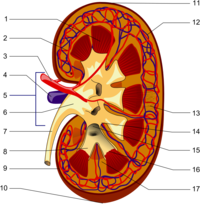
Photo from wikipedia
OBJECTIVE To characterize capillary perfusion and tissue diffusion changes in transplant renal artery stenosis (TRAS) with diffusion-weighted imaging (DWI). MATERIALS & METHODS We retrospectively identified 30 patients with non-contrast enhanced… Click to show full abstract
OBJECTIVE To characterize capillary perfusion and tissue diffusion changes in transplant renal artery stenosis (TRAS) with diffusion-weighted imaging (DWI). MATERIALS & METHODS We retrospectively identified 30 patients with non-contrast enhanced magnetic resonance angiography-proven TRAS. Another 20 kidney transplant recipients without TRAS were prospectively recruited to serve as control group. DWI parameters were compared among various groups with one-way analysis of variance and post hoc Tukey test. Additionally, DWI parameters were compared in 7 severe TRAS patients before and after successful angioplasty using paired Student t-test. Receiver-operating characteristic (ROC) curves were generated to evaluate the diagnostic performance of various DWI parameters. RESULTS All DWI parameters of renal cortex and medulla were not statistically different between normal allografts and allografts with mild TRAS. Nonetheless, cortical total apparent diffusion coefficient (ADCT) of allografts with moderate TRAS was significantly decreased compared with normal allografts. All cortical and medullary DWI parameters were significantly reduced in severe TRAS compared with normal allografts. ROC curve analysis indicated ADCT could identify severe TRAS with 93.8% sensitivity, 82.4% specificity and an area under the curve of 0.930. ADCT increased significantly after successful angioplasty while it showed no significant change in a patient with unsuccessful angioplasty. CONCLUSION DWI is a robust technique that revealed no tissue diffusion and perfusion impairment in mild TRAS. ADCT has good sensitivity and specificity for identifying patients with severe TRAS. DWI is potentially an alternative radiologic biomarker for assessing microstructural and perfusion alterations in TRAS. DWI is useful in detecting renal functional recovery following successful angioplasty.
Journal Title: Magnetic resonance imaging
Year Published: 2019
Link to full text (if available)
Share on Social Media: Sign Up to like & get
recommendations!